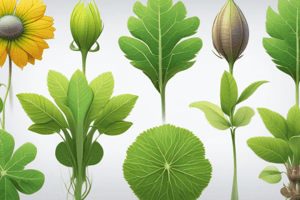Podcast
Questions and Answers
What is the main transport mechanism in plants that allows oxygen to flow from the atmosphere to the root system?
What is the main transport mechanism in plants that allows oxygen to flow from the atmosphere to the root system?
- Active pumping of oxygen
- Pressurized gas flow
- Passive diffusion (correct)
- Radial oxygen loss
What is the benefit of radial oxygen loss to the rhizosphere?
What is the benefit of radial oxygen loss to the rhizosphere?
- It decreases the water absorption capacity of the plant
- It increases the growth rate of the plant
- It supplies oxygen to nitrifying bacteria (correct)
- It prevents oxygen from reaching the roots
What is the result of the pressure gradient established in plants with pressurized gas flow?
What is the result of the pressure gradient established in plants with pressurized gas flow?
- Air flows from the roots to the stem
- Air flows from younger leaves to older leaves (correct)
- Air flows from older leaves to younger leaves
- Air flows from the stem to the leaves
What is the benefit of pressurized gas flow in plants?
What is the benefit of pressurized gas flow in plants?
What is the benefit of oxygen leakage into the surrounding soil?
What is the benefit of oxygen leakage into the surrounding soil?
Why do older leaves tend to become more leaky?
Why do older leaves tend to become more leaky?
What is the purpose of pressurized gas flow in plants?
What is the purpose of pressurized gas flow in plants?
What is a physiological adaptation to wetland environments?
What is a physiological adaptation to wetland environments?
Flashcards are hidden until you start studying
Study Notes
Plant Adaptations to Anoxic Conditions
- Pressurized gas flow is an adaptation in some plant species to cope with anoxic conditions, where oxygenated air is pumped down to the root system.
- This adaptation was first observed in the water lily species and has since been discovered in giant reed and alder shrubs.
- Passive diffusion is the main transport mechanism in plants, allowing oxygen to flow from the atmosphere to the root system.
- In plants with pressurized gas flow, pressure is generated in young leaves, forcing air down through the stem, oxygenating the root system, and eventually flowing out of older leaves.
- A single floating water lily leaf can take in up to 22 liters of air per day, making it an effective process for oxygenating the root system.
- The process works by creating an air pressure gradient from younger leaves to older leaves, as older leaves become leakier and lose their capacity to support internal air pressure.
Radial Oxygen Loss
- Radial oxygen loss is a physiological adaptation in plants to wetland environments, where oxygen leaks out into the surrounding soil environment from the roots.
- This adaptation has two benefits: it oxidizes toxic products caused by reducing conditions in wetland soils, preventing them from building up to harmful levels around the roots, and it supplies oxygen to nitrifying bacteria, which transform ammonium to nitrate, a readily available form of nitrogen for plants.
Tolerance to Anaerobic Respiration Byproducts
- Some wetland plants have adapted to tolerate the toxic end products of anaerobic respiration, such as ethanol and acetaldehyde.
- These plants have either efficient means of tolerating these byproducts or exporting them from the roots.
Studying That Suits You
Use AI to generate personalized quizzes and flashcards to suit your learning preferences.




